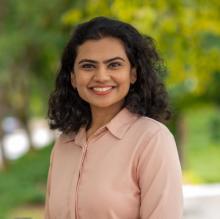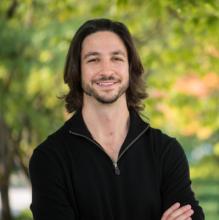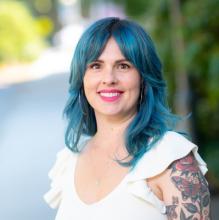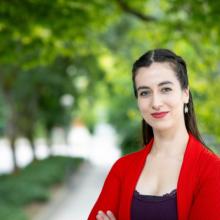Susanna’s research focuses on understanding the processes and dynamics that mediate food system sustainability. She uses interdisciplinary approaches to examine how context shapes the adoption of sustainable practices (the geography of sustainable agriculture), and how governance and policy interventions can facilitate more sustainable agroecological futures. Her PhD work investigates how organic certification is contributing to food system sustainability by assessing the adoption of practices and approaches that enhance agro-ecosystem health and social welfare on organic farms in Canada.
Research Description
Agriculture and food systems are at the center of some of society’s most critical challenges, including food insecurity, human rights violations, ecological degradation, and climate change. Organic agriculture is proposed as a solution to many food systems challenges, including as a way of providing better conditions for farm workers and improving environmental problems such as biodiversity loss. The field of organic agriculture emerged from a successful social movement that has achieved a recognized policy framework with established legislation to limit chemically-intensive farming practices. It is also a rapidly growing agricultural sector globally: acreage in organic agriculture increased by 15% between 2014 and 2015. Yet, there are important knowledge gaps about how farmers around the world are currently enacting internationally articulated organic principles of fairness and ecological integrity versus following jurisdictional regulations regarding chemical inputs. There is growing evidence that organic agriculture should not be conflated with sustainable agriculture, because organic standards do not directly regulate practices that facilitate either the social welfare of workers, or ecologically-beneficial management practices. While social justice and ecological health are foundational principles of the organics movement, there is variability in the extent and manner in which these principles are codified in organic regulations, and as such, a lack of certainty in how practices on organic farms are supporting these foundational principles. My doctoral research will investigate to what extent certified organic agriculture contributes to food system sustainability in Canada with a focus on agroecological health and job quality. This will be accomplished by (a) systematically reviewing published literature regarding socio-economic and environmental dimensions of organic performance in Canada; (b) assessing the variation in characteristics and management in organic and non-organic systems in Canada using agricultural census data; and (c) using survey and interview methodologies to assess how organic certification is facilitating a transition to a more sustainable food system. As a new wave of organic principles and priorities is articulated both in Canada and internationally that places significant emphasis on social justice and ecological diversity, and as the Canadian government has committed to reviewing the National Organic Standards in 2020, this research will add evidence and nuance to policy discussions at multiple scales.
What does being a Public Scholar mean to you?
I see academic research as a potentially powerful tool for societal change, if conducted in a way that is engaged and equitable, and communicated so that results are made accessible. As a public scholar, I aim to use my PhD project to inform changes in governance and policy by building relationships with farmers, practitioners, governments and organizations working in the field of sustainable (encompassing social justice, ecological health and economic viability) agriculture. The Public Scholars Initiative both supports and validates these efforts.
In what ways do you think the PhD experience can be re-imagined with the Public Scholars Initiative?
Initiatives like the PSI help to counter the isolating experiences of many doctoral students, and to connect doctoral research with society more broadly. Unfortunately, the metaphor of the Ivory Tower remains all too accurate in some areas of the University, where research happens in isolation from community and context, and rigour and engagement are considered to be mutually exclusive. This contributes to both the inequitable distribution of benefits from academic research, and also the negative experiences of many doctoral students. There are so many ways that research can be conducted and communicated in ways that facilitate collaboration and exchange – each PhD project could give life to so many points of collaboration and knowledge mobilization that I think the ways that the PhD experience can be re-imagined are endless. Essentially, I believe that a PhD project can be an opportunity for engagement and collaboration, and that this need/should not detract from academic rigour or value. This makes research more meaningful, impactful and fun (albeit, challenging in new ways…).
How do you envision connecting your PhD work with broader career possibilities?
As someone who has always been interested in interdisciplinarity and driven by passion for food systems and sustainability, I have always oriented my work and education around particular problems (and their solutions). I would not be doing a PhD if I could not do so in a more engaged, problem-oriented and interdisciplinary way. I think that this will prepare me for any number of career possibilities as I will leave with a diverse skill set, in-depth knowledge of regulatory context in Canada, and networks that extend beyond academic institutions into government, community organizations, and other agencies.
How does your research engage with the larger community and social partners?
I have been consulting with non-academic partners since the conception of my PhD project, including the Organic Industry Specialist with the BC Ministry of Agriculture, the Certified Organic Associations of BC, the Canada Organic Trade Association, and the Canadian Organic Growers. These conversations have informed my research questions themselves, and will also help me to ensure that my methods of data collection are well-grounded in context and do not duplicate other agencies’ efforts. These collaborations have expanded my knowledge and networks in many unforeseen ways: I have joined national conversations that I did not know were happening, will be hosting discussions that would not have previously been possible, and have connected with actors across the country whose work (in farming, research, activism, and policy) I was unfamiliar with. In addition to these engagement activities directly related to my PhD research, I am also on the Board of Directors for the leading national food security organization, and on research advisory committees for two research projects regarding institutional procurement and the accessibility of sustainably produced foods for low-income consumers. Being able to take part in these projects brings immense meaning to my work and helps show me the ways that research can be used to inform food system change on the ground.
Why did you decide to pursue a graduate degree?
I wanted to contribute to solving problems at the intersection of social equity, food security, and ecological health in a way that was innovative and transdisciplinary. With supportive supervisors for guidance, and the appropriate program for methodological training, a PhD can provide you with the right amount of freedom and autonomy combined with the necessary structures to pursue questions in a way that is both intellectually stimulating and personally rewarding.
Why did you choose to come to British Columbia and study at UBC?
A combination of the natural environment of British Columbia, the community of like-minded food systems researchers affiliated with the Centre for Sustainable Food Systems (CSFS), the academic environment fostered by the Institute for Resources, Environment and Sustainability (IRES), and my wonderful supervisors.
As a public scholar, I aim to use my PhD project to inform changes in governance and policy by building relationships with farmers, practitioners, governments and organizations working in the field of sustainable (encompassing social justice, ecological health and economic viability) agriculture.




